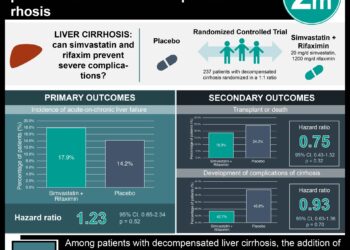Generic statins associated with better adherence and outcomes vs. brand names
1. In this observational trial, generic statins were associated with better adherence rates and clinical outcomes compared to brand-name statins.
Evidence Rating Level: 2 (Good)
Study Rundown: Statins are one of the most commonly prescribed medications in the United States. However, it remains unclear how brand-name statins may differ from generic statins in clinical practice. This observational study found that those who took generic statins, when compared to brand-name statins, showed a greater adherence to the therapy. Furthermore, those on generic statins were associated with a small, but statistically significant, decrease in the risk of hospitalization for acute coronary syndrome (ACS). The greatest strength of this trial is its inclusion of over 90,000 patients. A major limitation was the potentially confounding effects in the different populations that took brand-name statins versus generic statins. For example, patients that took brand-name statins were more likely to be white, male, and have a higher income. Overall, this study suggests that brand-name statins are not superior to generic statins, and may be associated with worse adherence rates and clinical outcomes.
Click to read the study, published today in the Annals of Internal Medicine
Relevant Reading: Adherence to Lipid-lowering Therapy and the Use of Preventive Health Services: An Investigation of the Healthy User Effect
In-Depth [systematic review]: Among the 90,111 patients included in this study, 93% initiated a generic statin and 7% initiated a brand-name statin. Simvastatin was the most commonly prescribed statin. To assess adherence, the proportion of days covered (PDC) of each group was measured. A statistically significant difference in PDC was noted between the two groups: 77% in the generic group and 71% for the brand-name group. Hospitalization for ACS was the only outcome found to be significantly decreased in the generic group, with a matched hazard ratio of 0.92 [CI=0.85-0.99]. Additionally, the composite endpoint, which included cardiovascular events and death, was also found to be significantly lower in the generic group with an absolute decrease of 1.53 events per 100-person-years. Although this observational study is limited by possible confounding factors, the correlation between PDC and outcomes illustrates the potential importance of improving patient adherence to prevent cardiovascular events.
More from this author: Efavirenz (Sustiva) for HIV patients may increase risk of suicideSocial integration may reduce suicide risk in male health professionals Hormone therapy may not prevent atherosclerosis in menopausal womenElevated troponin in chronic kidney disease associated with increased mortalityLow-carb, not low-fat, diet linked with increased weight loss
Image: PD
©2012-2014 2minutemedicine.com. All rights reserved. No works may be reproduced without expressed written consent from 2minutemedicine.com. Disclaimer: We present factual information directly from peer reviewed medical journals. No post should be construed as medical advice and is not intended as such by the authors, editors, staff or by 2minutemedicine.com. PLEASE SEE A HEALTHCARE PROVIDER IN YOUR AREA IF YOU SEEK MEDICAL ADVICE OF ANY SORT.







